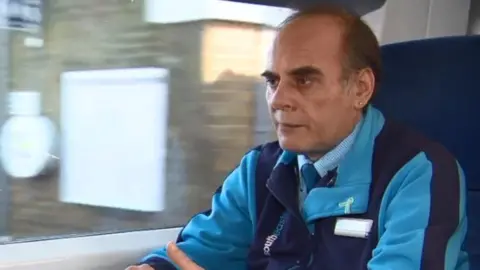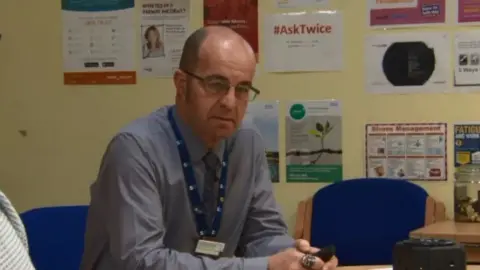Southeastern: 'My three weeks of hell working on the railway'
A rail worker thrown from a train by an angry passenger during "three weeks of hell" at work has spoken of the impact it had on his mental health.
Southeastern train manager Neil Chapman said he was close to "losing it completely" before seeking help.
Increased episodes of violence and people taking their own lives have contributed to Mr Chapman's struggles.
However, he has turned his life around with the help of a scheme started by the rail firm and a colleague.
Mr Chapman said Lee Woolcott-Ellis, a fellow train manager who persuaded bosses to let him set up a mental health support system, was a "genius".

Mr Chapman's problems started with an attempted suicide in front of his train. Then, about a week later, he woke up a sleeping passenger.
"He'd missed his stop and of course somehow that was my fault," said Mr Chapman.
"When I told him he'd have to get off the train, he actually says 'you get off' and grabbed me by the scruff of the neck and physically threw me off the train, actually assaulted me."
The following couple of weeks "it just seemed every other passenger was somebody giving me grief, didn't want to buy a ticket, wanted to pay for nothing and all that sort of thing".
"I came very, very close to losing it completely, and I ended up taking three months off with stress."

In January, a report from mental health charity Mind and consultancy firm Deloitte showed poor mental health in the workplace cost UK companies more than £43bn in 2018, with the number of days taken off for mental health reasons rising even though total sick days in general were falling.
Figures provided by Southeastern showed 2018 had the highest number of reports of violence and serious public order offences since 2007.
Between 2014 and 2018 there were 3,233 reports of violence and 3,243 reports of serious public order.
Mental health co-ordinator Mr Woolcott-Ellis said: "I've been certainly threatened to be stabbed on more than one occasion. I've had someone on my train threatening to kill people.
"That individual, I removed a knife from him. You deal with it as a professional and it's afterwards you think of the implications of what you've just been through."
Mr Chapman credits Mr Woolcott-Ellis with saving his job.
"He has helped so many people," he said.
"You can learn these things out of books, you can get your trained, qualified psychiatrists and psychologists but because Lee's been through it, because he's experienced it for himself, it gives him so much more of an insight.
"He saved my job, almost saved my life. I don't know how far I would have gone. With Lee's help, I'm just back to me."
Southeastern said rail travel was one of the safest means of transport, with the "vast majority" of the 640,000 passengers that use its services each day travelling without incident.
It said it was "proud to have developed a mental health advocate scheme led by our staff" to respond to "occasions when incidents happen, both at work and outside work".

You can see more on Inside Out South East at 19:30 GMT on BBC One, and later on BBC iPlayer
Follow BBC South East on Facebook, on Twitter, and on Instagram. Send your story ideas to [email protected].
